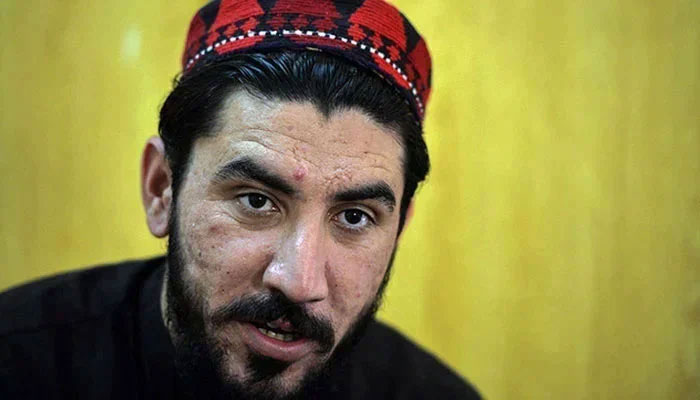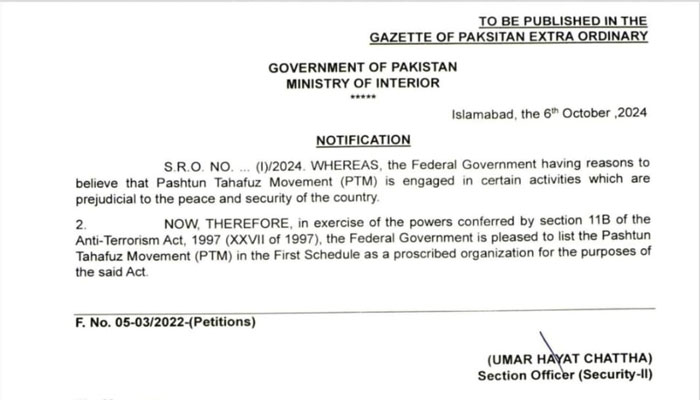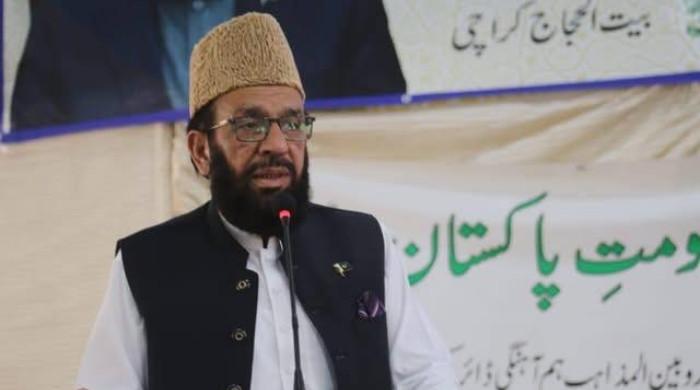Govt slaps ban on Pashtun Tahafuz Movement citing 'risk to peace, security'
Ban has been placed under Section 11B of the Anti-Terrorism Act 1997 as Manzoor Pashteen-led party put on First Schedule
October 06, 2024

- Manzoor Pashteen-led party put on First Schedule by authority.
- Ban placed under Section 11B of the Anti-Terrorism Act 1997.
- Ministry cites activities prejudicial to the peace and security.
ISLAMABAD: The Shehbaz Sharif-led coalition government on Sunday issued a notification banning the Manzoor Pashteen-led Pashtun Tahafuz Movement (PTM).
"The federal government having reasons to believe that the PTM is engaged in certain activities prejudicial to peace and security of the country [...] is pleased to list the PTM in the First Schedule as a proscribed organisation," read the notification issued by the Ministry of Interior.
The ban has been placed under Section 11B of the Anti-Terrorism Act 1997.
The development comes as the country is facing a rather tumultuous political and security situation amid ongoing protests by the Pakistan Tehreek-e-Insaf (PTI) in Islamabad as well as a surge in terrorist attacks in parts of the country.
A day earlier, a Pakistan Army lieutenant colonel was among six soldiers who embraced martyrdom during a gun battle with terrorists in North Waziristan's Spinwam area.
The attack came as the country has witnessed a surge in terror incidents with total fatalities from three-quarters of the ongoing year surpassing the total fatalities recorded for the entire 2023 as reflected in the data gathered by the Centre for Research and Security Studies (CRSS).

The statistics come against the backdrop of increased terror incidents in the country is set to host the Shanghai Cooperation Organisation (SCO) summit.
The ban on the PTM comes as the party has had arguably a controversial relationship with authorities over the years with its leaders Manzoor Pashteen, Ali Wazir and others facing the heat on multiple occasions.
Last month, Wazir's — who is in Rawalpindi's Adiala jail facing terrorism charges — detention was extended for a period of 15 days under the MPO 3.
The ex-MNA from South Waziristan has spent years in jail as he was booked in several cases in different police stations, pertaining to delivering hate speeches against state institutions. He was released multiple times but arrested again.
The former parliamentarian was arrested by Islamabad police from the Pakistan Institute of Medical Sciences (Pims) Hospital in August where he brought an injured youth following an accident with the politician's car.
In December last year, PTM chief Pashteen was arrested after his security guards allegedly opened fire targeting the police.
Back in 2019, a petition was filed in the Islamabad High Court seeking a ban on the party. The plea was filed a day after three people were killed and five soldiers injured in a clash between security forces and PTM protesters in North Waziristan.
As per the military's media wing, a group of protesters led by then-PTM lawmakers Mohsin Javed and Wazir assaulted the Kharqamar check post in Boyya area of North Waziristan.
Before that the then Inter-Services Public Relations (ISPR) director general Major General Asif Ghafoor termed the PTM's stance on the issues faced by tribals as unaccepted saying that the army had refrained from taking action against the PTM's controversial slogans.
In 2022, Pashteen was booked on terrorism charges, following his speech at the Asma Jahangir Conference where he had criticised the country's armed forces.
In his speech, as per the publication, the PTM chief that the regime targeted every journalist, individual, or group which was thinking independently.
The first information report (FIR) filed against Pashteen included provisions namely Sections 124A, 149, 305 PPC and Anti-Terrorism Act, 1977-II-X.











